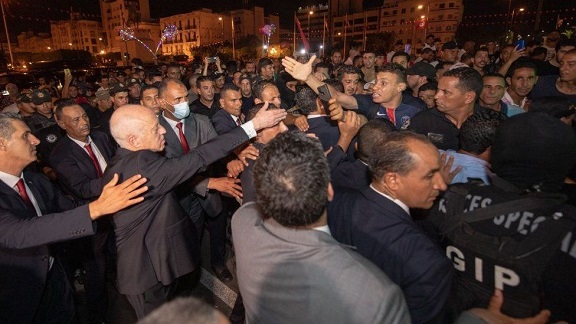A vast majority of Tunisians appear to have backed controversial reforms to the country's constitution in a referendum.
According to initial results, 94.6% of voters supported plans to grant vast new powers to the country's leader.
President Kais Saied pushed for the changes which he said would break Tunisia's political paralysis.
But opposition groups, who boycotted the vote, said the results were not legitimate.
READ ALSO: Zimbabwe launches gold coins to tackle soaring inflation
Mr Saied's political rivals accused the country's electoral board of "fraud" and said they would not recognise the newly approved constitution - which is expected to come into force when the final poll results are published.
There was no immediate reaction from President Saied or from the country's Electoral Commission to the accusations.
Turnout in the referendum was low with fewer than one-third of voters turned up to cast a ballot in Monday's vote, according to early figures from election officials.
Tunisia's new constitution would give the head of state full executive control, supreme command of the army and the ability to appoint a government without parliamentary approval.
It would also weaken Tunisia's judiciary and remove checks on the powers of the presidency.
In practice, President Saied has already been ruling by decree since this time last year - when he dramatically moved to suspend parliament and dismiss the government.
Critics fear the new constitution will codify the president's newly-acquired authority, reducing the constraints on his personal powers and eroding the country's relatively young democracy.
Many others supported the changes in the hope that the new constitution would mark a new chapter - freeing Tunisia from the political bickering and government paralysis and reducing the influence of the country's largest Islamist party.
Monday's poll saw just 30.5% of eligible voters casting a ballot, according to early official figures.
That is fewer than the number of people who voted in any of the five major votes held in Tunisia since 2011, when the country overthrew its long-serving ruler Zine al-Abidine Ben Ali and became the birthplace of the Arab Spring that then swept across the Middle East.
Until recently, Tunisia was the only nation considered to have emerged from the uprisings as a democracy.
President Saied said his reforms were being done in the spirit of that 2011 revolution, safeguarding Tunisia's future and ending years of economic decay.
"Our money and our wealth are enormous, and our will is even greater, to rebuild a new Tunisia and a new republic, one that breaks with the past," the president said after voting on Monday morning.
BBC





